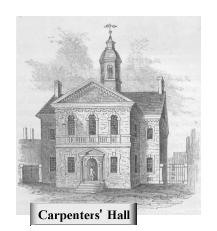
The first Continental Congress met in Carpenter's Hall in Philadelphia, from September 5, to October 26, 1774. Carpenter's Hall was also the seat of the Pennsylvania Congress. All of the colonies except Georgia sent delegates. These were elected by the people, by the colonial legislatures, or by the committees of correspondence of the respective colonies. The colonies presented there were united in a determination to show a combined authority to Great Britain, but their aims were not uniform at all. Pennsylvania and New York sent delegates with firm instructions to seek a resolution with England. The other colonies voices were defensive of colonial rights, but pretty evenly divided between those who sought legislative parity, and the more radical members who were prepared for separation. Virginia's delegation was made up of a most even mix of these and not incidentally, presented the most eminent group of men in America. Colo. George Washington, Richard Henry Lee, Patrick Henry, Edmund Pendleton, Colo. Benjamin Harrison, Richard Bland, and at the head of them Peyton Randolph — who would immediately be elected president of the convention.
The objectives of the body were not entirely clear but, with such leadership as was found there, a core set of tasks was carried out. It was agreeable to all that the King and Parliament must be made to understand the grievances of the colonies and that the body must do everything possible to communicate the same to the population of America, and to the rest of the world.
The first few weeks were consumed in discussion and debate. The colonies had always, up to this time, acted as independent entities. There was much distrust to overcome. The first matter to be considered by all was A Plan of Union of Great Britain and the Colonies, offered by Joseph Galloway of Pennsylvania. The plan was considered very attractive to most of the members, as it proposed a popularly elected Grand Council which would represent the interests of the colonies as a whole, and would be a continental equivalent to the English Parliament. Poised against this would be a President General, appointed by the crown, to represent the authority of the king in America. Conflict in Boston overcame the effort at conciliation. The arrival of the Suffolk County (Boston) resolves just prior to the vote on the Plan of Union, caused it to be discarded by a narrow margin.
No comments:
Post a Comment